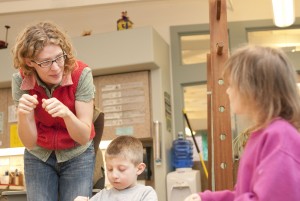Background:
In 2011, the Research Ambassador Program (RAP) recruited ten Fellows to come to the Evergreen State College campus for intensive training in communication of their research to non-traditional audiences. This allowed the Fellows to gain personalized guidance on disseminating their own research to established groups and create springboards for outreach in their home communities, and for the RAP staff to evaluate the efficacy of their activities.
Bio
Denise’s research interests are in ecosystem ecology, biogeochemistry and aquatic ecology, with fieldwork in headwater streams, large rivers, lakes, and coastal ecosystems. Denise’s work crosses traditional disciplinary barriers, allowing her to draw parallels and make applications stream ecology, limnology and land management.
Denise is from Rockford, Illinois. She graduated in 2001 with a B.S. in Biology from Winona State University, Minnesota. She examined competition between zebra mussels and hydropsychid caddisflies in the Upper Mississippi River for her undergraduate thesis. Denise then worked at the USGS Upper Midwest Environmental Sciences Center in LaCrosse, WI as a research technician to examine seasonal nitrogen cycling. In 2002, Denise came to the University of Notre Dame. Her postdoctoral research in New Zealand examined how recent increases in agriculture and subsequent nutrient pollution alters nitrogen and carbon cycling in the Rotorua Lakes. Currently, Denise is examining N cycling and ecosystem metabolism in rivers and coastal bays of South Texas. The goal of this project is to develop a pilot water quality management program for Gulf of Mexico bays at the University of Texas Marine Science Institute. Denise lives in Port Aransas, Texas with her husband and 1-year old son.
Components of her Fellowship
Communications Mentoring
RAP staff walked through Denise’s draft PowerPoint presentations, offering pointers and clarifications, and adjustments to make the presentations appropriate for specific audiences that Denise spoke to or wrote for, based on established contacts and experiences. RAP staff also helped Denise distill a statement of her primary research interests, which was then videotaped for use on her website.
Stafford Creek Corrections Center
In partnership with the Sustainable Prisons Project, Denise spoke to 40 offenders and staff at the Stafford Creek Corrections Center. Denise explained freshwater nitrogen flux dynamics, and her research methods seeking to understand where nitrogen goes in river ecosystems.
The inmates showed a high level of understanding of the ecology discussed as they asked in-depth conversations about the movement of nitrogen through ecosystems, and the actions that individuals, corporations, and regulators can take to affect nitrogen concentrations and ‘dead zones.’
The Evergreen State College Campus Children’s Center
Although science curricula and standards are common for K-12 education, there is little attention to introduce 3 – 5 year olds to science or scientific concepts.
Denise explained herself as a scientist that loves to study mud. She prepared a short (5-10 minute) PowerPoint exploring mud, and how nitrogen (in mud) can be considered the ‘food’ that keeps ecosystems functioning. Then, the twelve 4-5 year olds at The Evergreen State College Campus Children’s Center used soil and water to make their own mud and considered how plants may or may not grow in their mud depending on whether there’s enough nitrogen available to them. The morning was topped off with a mud song and a cheer for nitrogen.
We also received a visit from The Evergreen State College’s Media Services department, which produced this one minute piece about our work and Denise’s presentation. One Minute Evergreen: Our Future Scientists
Science Seminar
Denise presented her scientific work to a group of faculty, students and staff at The Evergreen State College.
Reflections and Lessons Learned
Denise’s role as a postdoctoral fellow within the National Estuarine Research Reserve (NERR), will allow Denise to use skills gained during her fellowship.
Preparing for her talk at the Children’s Center was difficult, as we faced the challenge of interpreting nitrogen molecules – which are invisible – to children. Denise’s love of, and study of, nitrogen in mud provided a critical linkage that grabbed children’s attention.
Overall, Denise found a new balance among our fellows of providing enough material for audiences to think about, without offering too much and losing audiences in the scientific details. This has proven a difficult ‘sweet spot’ for all of our fellows to locate.
Aftermath:
Communication after Denise’s return to her home institution included the following:
- RAP staff arranged to have the Provost at Evergreen send a formal letter of acknowledgment to her so that she has an appropriate academic reward;
- RAP staff invited her to participate in an upcoming workshop on the RAP at the annual meeting of the Ecological Society of America
- Denise is planning to give her outreach talk about nitrogen at some local venues in South Texas and will be encouraging her REU (Research Experience for Undergraduates) student to do the same with the research they will conduct this summer.
